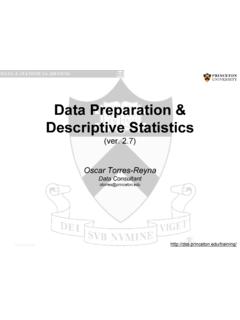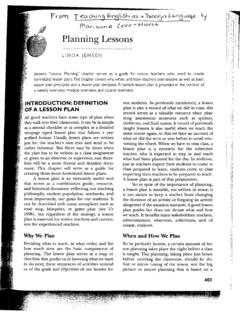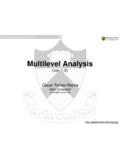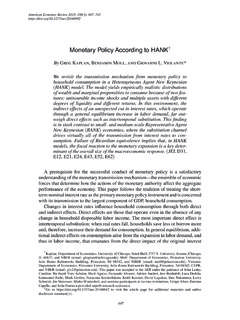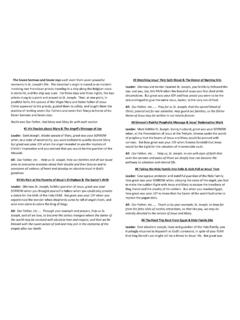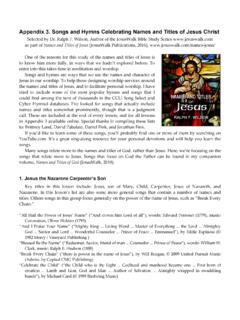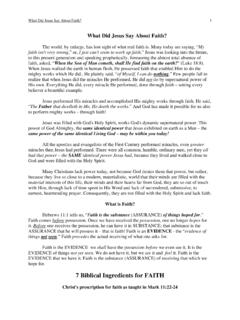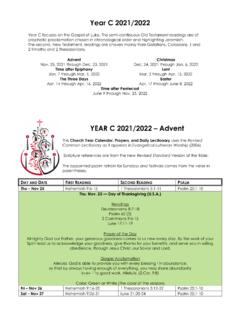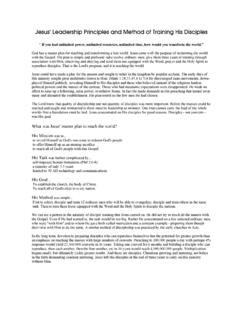Transcription of Jesus Christ, the Liberator 1. Introduction
1 THEO 275 Christology Term Paper Sr. Kathleen Flanagan By Hugo Passos Sim o Jesus Christ, the Liberator 1. Introduction In their attempt to understand, describe and relate to the person of Jesus of Nazareth, Christians over the centuries have used many None of them is sufficient by itself, nor combined do they completely embrace the person of Jesus Christ. Gerald O Collins (1998) points out that St. Basil of Caesarea in his De Spiritu Sanctu of 375 CE, highlighted the functional motivation for many of Jesus titles: Because of the many ways grace is given to us poor human beings by him whose goodness and wisdom are manifold, he is described by innumerable other titles: Shepherd, King, Physician, Bridegroom, Way, Door, Fountain, Bread, Axe, and Rock. These titles do not describe his nature, but.
2 Are concerned with his manifold energies, by which he satisfies the needs of each ( ). Calling Jesus the Liberator is to some extent a redundancy, because the meaning of the name Yehosua in Hebrew is God saves or God is salvation. Although the Hebrew Scriptures use this title to some human figures (kings and prophets), the Christian Scriptures reserve savior only for God and Luke links the anointing of Jesus with his liberation ministry in passages like Luke 4:16-21 (where Jesus is announcing at a synagogue in Nazareth the fulfillment by his person of a promise from Isaiah) or Acts 10:38 (where Peter is preaching about Jesus at Cornelius house). These passages highlight Jesus power to deliver and release those who are poor, oppressed, handicapped or have fallen under the control of the devil.
3 Recognizing that Jesus , the Liberator is just one of the facets of the ministry of the Incarnate Son to humanity, we will in the next sections attempt to give an idea of the history of this title and its theological place in the manifold life of the Church. In the next section we will explore the title from the perspective of the Synoptic Gospels in general, and from Luke s Gospel in particular. In the third section, we will link this title to a significant theological development of the twentieth century: the Liberation Theology. In section four, we will discuss the original, and still most visible and vibrant of the manifestations of the Liberation Theology in the Church: the one in Latin America. And finally, in the last section of the paper, we will report on the current status of this theology within the Catholic Church and make some personal comments about it.
4 1 Robert Brown listed: Lord, Messiah, Master, Son of God, Son of Man, Teacher, Victor, Lamb of God, Healer, savior and Word. 2 O Collins (1998), page 21. 2. Jesus , the Liberator the view from the Gospels Naming Jesus the Liberator is practically synonymous with naming him savior , Redeemer, and Deliverer. Incidentally, the Catechism of the Catholic Church in referring to Christ s work, uses the terms redemption, salvation, and liberation in that order of The apparent tension in Jesus preaching about the yet-to-come kingdom of God and the already-here kingdom is like the two sides of a same coin. One implies the other. The eschatological work of Christ and His Spirit necessarily leads all people towards an authentic social and political progress here and now.
5 The liberating work of the crucified and risen Jesus encompasses not only the age to come, but also the present human life on O Collins (1998) gathered from the Gospels some instances of Jesus social activism towards the realization of the kingdom here and now: 51. Jesus concern with human progress in the social area: rejection of divorce by either partner (Mark 10:2-12); command to love one s enemies (Luke 6:27-28); foundation for men and women of a new egalitarian family based on obedience to the divine will (Mark 3:34-35). 2. Jesus touching the political life of people, both nationally and internationally: extending the divine mercy to tax-collectors, who collaborated with Roman and Jewish leaders (Luke 18:9-14; 19:9-10); speaking out against hatred of foreigners in the parable of the Good Samaritan (Luke 10:30-37); prophetically electing the Twelve as a symbol of his desire to reform Israel (Mark 3:13-19).
6 3. Jesus leading the way in delivering people from bondage with a religious revolution with obvious social and political implications: his table fellowship with impure outcasts (Mark 2:13-17; Matthew 11:19; Luke 15:1; 19:7); his attitude in welcoming women as disciples (Luke 8:1-3). Quoting Meier, O Collins states that through the beatitudes, Jesus is promising to do in his kingdom what Israel s human kings often failed to do: defend widows and orphans, secure the rights of the oppressed, an in general see justice done. 6 He also expresses his view that in Jesus sermon in the synagogue in Nazareth, Luke was expressing what Jesus proclamation aimed at: a new religious and social order that would bring liberation for those oppressed by various forms of evil. 7 O Collins further states that Mark and then Luke and Matthew, when remembering and interpreting Jesus for their communities of faith, acknowledged, or at least implied, that the offer of divine 3 Ibid, page 23.
7 4 Ibid, page 24. 5 Ibid, page 25-26. 6 Ibid, page 29. 7 Ibid, page 30. 2salvation he made through his words and deeds also enjoyed massive social and political repercussions. The new attitudes towards and relationships with others that he encouraged must deeply shape human beings in their progress towards a new society, both here and hereafter. 8 O Collins, however, points out that the modern dream of emancipation, through which free and intelligent human beings would everywhere become active subjects of civilized progress rather than remain passive objects of oppression, has collapsed. Along with the rational liberalism encouraged by the Enlightenment, Marxism now counts among the gods who have failed. 9 Therefore, more than ever, we Christians are called to fully live the Gospel values (Redemptoris Missio, 20) as in hope we all journey together towards the final kingdom.
8 In a special, but not exclusive way, Christ s liberating work continues through the Church, the sacrament of salvation for all human beings. Christ s community serves the kingdom by its preaching, by sharing new life in him, and by its commitment to justice and peace, education and the care of the sick, and aid to the poor and children (ibid.) .10 Christian believers should seek to alleviate and eliminate misery through working for a world situation in which individuals will be freed from all oppression. The bishops at Vatican II reflected on the manifold nature of this degradation: Never before today have human beings been so keenly aware of freedom, yet at the same time, new forms of social and psychological slavery make their appearance (Gaudium et Spes, 4) 11 The work of Christ, the Liberator , is the core thread between the kingdom here and now and the kingdom yet to come.
9 Again, from O Collins, faith in Christ s liberating work inescapably implies an obligation to strive for progress towards peace in our world. That earthly life continues to be so brutal for so many is intolerable. Their faith in Jesus our Liberator should impel Christians to take up the cause of those who suffer economic injustice, cultural backwardness or any other form of human misery. Jesus account of judgement sets our hope for the coming kingdom in just such a context of responsibility for the alleviation of physical and mental suffering. I was hungry and you gave me food (Matt 25:35). The sequence is not: I was hungry and you preached patience to me. There is a hard particularity about the duty imposed by the hope for the coming kingdom.. Social and political action proves the truth of our belief in the climax of Christ s liberating work: the complete redemption to come for human beings and their world.
10 12 E. Scheffler, a South African theologian, also extracts from the Gospel of Luke an image of Jesus as the savior or Liberator for various kinds of human sufferings: political, economical, social, psychological, physical, and spiritual. According to him, Jesus himself also suffered on these different levels of life and is also ultimately exalted after 8 Ibid, pages 32-33. 9 Ibid, page 33. 10 Ibid, pages 33-34. 11 Ibid, page 34. 12 Ibid, page 34. 3the humiliation of his death. 13 Scheffler points out that Jesus stern command to his disciples not to tell anyone about his Messiahship (Mark 8:3) has been used by many commentators to try to make Jesus out as a completely a-political figure, a view that Scheffler strongly disagrees with. For him, Jesus Messiahship does have political implications, but the difference is that it entails far more than what is contained in national and political expectations.
